Author Archives: Mississippi Catholic
Youth
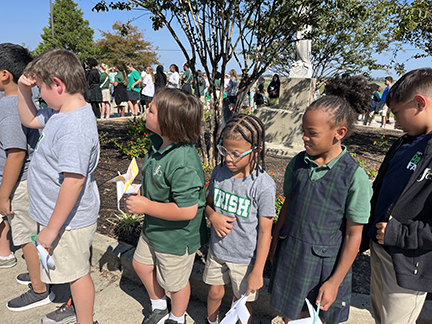
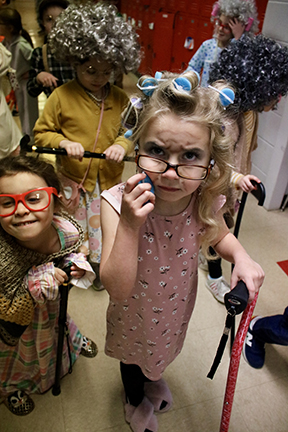

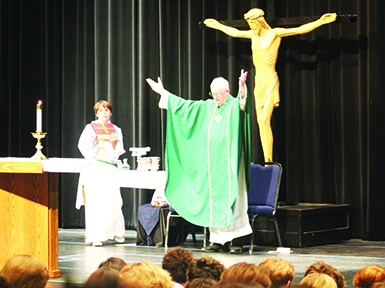
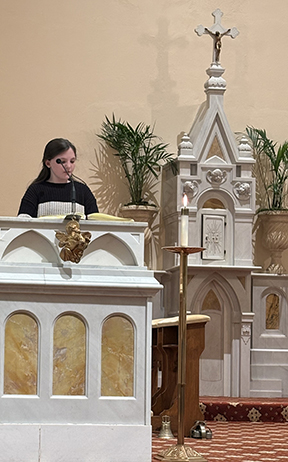
Martin Luther King: a “Moses” of the 20th century
(Editor’s note: This reflection by a local parishioner was read at an event organized by the Office of Intercultural Ministry in honor of the life of Dr. Martin Luther King, Jr. at the Cathedral of St. Peter in Jackson on Saturday, Jan. 18. The theme was “On the Path to Fulfilling the Dream” with speaker Constance Slaughter-Harvey.)
By Dorothy Davis Ashley
CRASH! The sound of broken glass caused by a brick startled me! It had been thrown by an irate individual demonstrating his rage against ideas of equality of Black citizens in our small Delta town of Indianola, Mississippi. The brick was thrown into our sliding glass patio door one summer night as I sat with my parents watching television. It was around 1966, and I was nine years old. Indianola, Mississippi was in the midst of the Civil Rights unrest and Black citizens would meet periodically at St. Benedict the Moor Catholic Church Center and strategize under the guidance of the local priest, Father Walter Smiegel and Attorney Carver Randle, Sr.
As a young girl of nine years of age, I remember there were “separate and unequal” bathrooms, separate seating areas in doctor’s offices and movie theaters for “White” and “Colored,” and segregated schools for the “colored children.” The Mississippi Delta with its rich cotton fields was also where Black cotton pickers and “field hands” worked in the cotton fields, aka “Delta gold,” many living in shotgun houses on the plantations of their employers.
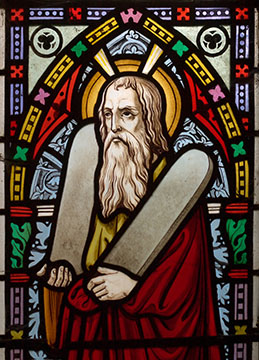
Looking back on my history and the many roads I have travelled since my childhood and that fateful night a brick was thrown into my parent’s patio door, I think of Dr. Martin Luther King as being a “Moses” for Black (aka “African Americans”), all oppressed people and those who were treated unfairly and unjustly in the South, particularly. Like Moses, I think he was chosen and led by God for his mission. It is because of his leadership which initiated the Civil Rights era that I was able to attend the majority “White” (aka “Caucasian”) Catholic School, St. Joseph in Greenville, Mississippi in the early 70s and the University of Mississippi Medical Center School of Health-Related Professions in Jackson in the early 80s which earned me a degree in physical therapy and the opportunity to work in medical facilities which once barred Black citizens from entering the same door, much less becoming an employee with equal pay and benefits as my counterparts.
Like Moses, he had humble beginnings and became a strong voice against oppression to the political leaders of his day. Like Moses, Dr. Martin Luther King never reached the “Promised Land” but saw its vision. His message was one of prayer, peace, humility, faith, strength, solidarity, organization and perseverance. I am grateful to God and to him for his courage, vision and answering God’s call. In part, my career progression in the medical and later spiritual pathways as a Secular Order Carmelite, hospital chaplain and spiritual director were affected and made possible because of his message.
(Dorothy Ashley is a parishioner of Holy Ghost Church in Jackson.)
Happy Ordination Anniversary
February 6
Bishop Joseph R. Kopacz
(ordained bishop)
February 7
Father Hendrik Ardianto, SCJ
Catholic Parishes of Northwest Mississippi
February 14
Father Jofin George
Holy Cross, Philadelphia
February 19
Father Vijaya Bhaskar Madanu, SVD
Holy Ghost & Holy Family, Jackson
Thank you for answering the call!
Holy Year pilgrimage is chance to begin again, pope says
By Cindy Wooden
VATICAN CITY (CNS) – A holy year is an opportunity to start fresh with one’s relationship with God and with other people, Pope Francis told thousands of pilgrims.
The Holy Year 2025 theme, “Pilgrims of Hope,” is a reminder that hope “is not a habit or a character trait – that you either have or you don’t – but a strength to be asked for. That is why we make ourselves pilgrims: We come to ask for a gift, to start again on life’s journey,” the pope said Jan. 11.
Meeting more than 7,000 pilgrims who filled the Vatican audience hall or pressed against crowd-control barriers outside, Pope Francis began a series of Saturday general audiences designed, as he said, to “welcome and embrace all those who are coming from all over the world in search of a new beginning.”
Throughout the audience, the pope had the crowd repeat “ricominciare,” Italian for “begin again.”
The audience was held the day before the feast of the Baptism of the Lord when the church commemorates Jesus going down to the Jordan River and joining the crowds who responded to St. John the Baptist’s call for conversion.
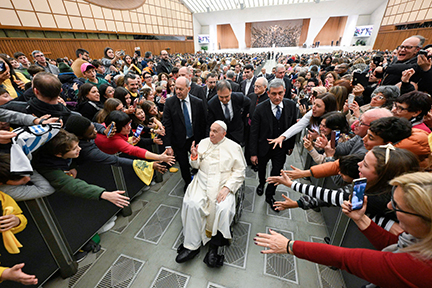
A summary of the pope’s talk, read to the pilgrims in English, said that John the Baptist’s “message in calling for conversion was one of hope in the advent of the Messiah, a hope fulfilled in the coming of Jesus and his invitation to welcome the kingdom of God.”
“Like the crowds that flocked to the waters of the Jordan, may all who pass through the Holy Door this year receive the grace of interior renewal, openness to the dawn of God’s kingdom and its summons to conversion, fraternal love and concern for the least of our brothers and sisters,” the pope’s message to English-speakers said.
On a Holy Year pilgrimage and, more generally, on the journey of life, “we, too, bring many questions,” the pope told the pilgrims, but Jesus replies by pointing to a “new path, the path of the Beatitudes,” which proclaims how blessed are the poor in spirit, those who mourn, those who struggle for justice and those who work for peace.
“Hope for our common home – this Earth of ours, so abused and wounded – and the hope for all human beings resides in the difference of God. His greatness is different,” the pope said. Jesus demonstrated how greatness comes not from domination, but from learning “to serve, to love fraternally, to acknowledge ourselves as small. And to see the least, to listen to them and to be their voice.”
Trump administration reverses policy to permit ICE arrests at churches
By Kate Scanlon
WASHINGTON (OSV News) – The Trump administration said Jan. 21 it would rescind a long-standing policy preventing Immigration and Customs Enforcement agents from making arrests at what are seen as sensitive locations, including houses of worship, schools and hospitals.
Prior to his second inauguration, Trump’s transition team indicated his administration would scrap the long-standing ICE policy – which prohibits immigration enforcement arrests at such locations, as well as other sensitive events like weddings and funerals without approval from supervisors. Catholic immigration advocates expressed alarm at the announcement.
Acting Department of Homeland Security Secretary Benjamine Huffman directed on Jan. 20 that those guidelines be rescinded, as well as issuing another directive restricting parameters for humanitarian parole, a DHS spokesperson said.
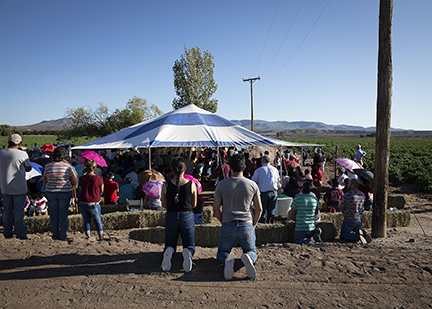
“This action empowers the brave men and women in CBP and ICE to enforce our immigration laws and catch criminal aliens – including murders and rapists – who have illegally come into our country,” a DHS spokesperson said. “Criminals will no longer be able to hide in America’s schools and churches to avoid arrest. The Trump Administration will not tie the hands of our brave law enforcement, and instead trusts them to use common sense.”
Bishop Mark J. Seitz of El Paso, Texas, said in a Jan. 21 statement the policy change is one of “many drastic actions from the federal government related to immigration that deeply affect our local community and raise urgent moral and human concerns.”
“The end of the Department of Homeland Security’s sensitive locations policy strikes fear into the heart of our community, cynically layering a blanket of anxiety on families when they are worshiping God, seeking healthcare and dropping off and picking up children at school,” Bishop Seitz said. “We have also seen the rapid and indiscriminate closure of the border to asylum seekers and the return of the ill-conceived Remain in Mexico policy, violating due process and restricting the few legal options available to the most vulnerable who knock on our door seeking compassion and aid.”
Bishop Seitz added that he wanted to assure El Paso’s immigrant community that “whatever your faith and wherever you come from, we make your anxieties and fears at this moment our own.”
“We stand with you in this moment of family and personal crisis and pledge to you our solidarity, trusting that the Lord, Jesus Christ, will bring about good even from this moment of pain, and that this time of trial will be just a prelude to real reform, a reconciled society and justice for all those who are forced to migrate,” he said.
The Diocese of El Paso, Bishop Seitz added, “will continue to educate our faithful on their rights, provide legal services and work with our community leaders to mitigate the damage of indiscriminate immigration enforcement. Through our Border Refugee Assistance Fund, in partnership with the Hope Border Institute, we are preparing to channel additional humanitarian aid to migrants stranded in our sister city of Ciudad Juarez.”
Dylan Corbett, executive director of Hope Border Institute, told OSV News, “The reversal of the sensitive locations policy is gravely troubling and will have an immediate impact on families in our parishes as well as on our Catholic educational institutions and service organizations.”
“It is an attack on members of our community at pivotal moments in their life – dropping off and picking up children, seeking out health care and worshipping God,” he said. “There are serious religious liberty implications and it strikes at the core of the trust that is indispensable to a safe community. It is also a sad and troubling step in the direction of indiscriminate deportations.”
South Dakota Gov. Kristi Noem, who has also taken hardline immigration positions, is Trump’s nominee to lead the Department of Homeland Security, but she has not yet been confirmed by the Senate.
(Kate Scanlon is a national reporter for OSV News covering Washington. Follow her on X @kgscanlon.)
USCCB president calls Trump orders on migration, death penalty ‘deeply troubling’
By Kate Scanlon
WASHINGTON (OSV News) – Executive orders signed by President Donald Trump on issues including migration, the environment and the death penalty are “deeply troubling,” Archbishop Timothy P. Broglio, president of the U.S. Conference of Catholic Bishops, said in a Jan. 22 statement, while praising another on gender policy.
Among the first acts of his second term beginning Jan. 20, Trump signed a slew of executive orders. Some implement his hardline policies on immigration, including seeking to change the interpretation of birthright citizenship under the 14th Amendment, an order that prompted a legal challenge.
Others include withdrawing from the 2015 Paris Agreement on climate and another sought to expand the use of the federal death penalty. Trump also signed an order directing the U.S. government to only recognize two sexes, male and female.
Archbishop Broglio, who heads the U.S. Archdiocese for the Military Services, said many of the topics that the first batch of executive orders concern “are matters on which the Church has much to offer.”
“Some provisions contained in the Executive Orders, such as those focused on the treatment of immigrants and refugees, foreign aid, expansion of the death penalty, and the environment, are deeply troubling and will have negative consequences, many of which will harm the most vulnerable among us,” he said. “Other provisions in the Executive Orders can be seen in a more positive light, such as recognizing the truth about each human person as male or female.”
Archbishop Broglio stressed that neither the Catholic Church nor the USCCB is “aligned with any political party.”
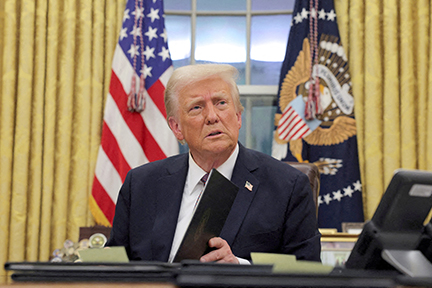
“No matter who occupies the White House or holds the majority on Capitol Hill, the Church’s teachings remain unchanged,” he said. “It is our hope that the leadership of our Country will reconsider those actions which disregard not only the human dignity of a few, but of us all.”
Executive orders are legally binding directives from the president and are published in the Federal Register. At the same time, the term “executive actions” is broader and may include informal proposals for policy the president would like to see enacted. While it is typical for new presidents to issue some executive orders on their first day in office to signal certain priorities, Trump signed a larger number of orders than usual.
Citing the current Jubilee Year of Hope declared by Pope Francis, Archbishop Broglio said, “As Christians, our hope is always in Jesus Christ, who guides us through storm and calm weather.
“He is the source of all truth,” Archbishop Broglio said. “Our prayer is one of hope that, as a Nation blessed with many gifts, our actions demonstrate a genuine care for our most vulnerable sisters and brothers, including the unborn, the poor, the elderly and infirm, and migrants and refugees. The just Judge expects nothing less.”
Also among its first actions, the Trump administration said Jan. 21 it would rescind a long-standing policy preventing Immigration and Customs Enforcement agents from making arrests at what are seen as sensitive locations, including houses of worship, schools and hospitals.
Bishop Mark J. Seitz of El Paso, Texas, said in a Jan. 21 statement the policy change is one of “many drastic actions from the federal government related to immigration that deeply affect our local community and raise urgent moral and human concerns.”
Bishop Seitz, who heads the USCCB’s migration committee, told reporters at the bishops’ general assembly in November that the bishops would watch how Trump’s migration policy actually unfolds and “raise our voice loudly” if those policies violate basic human rights protections.
(Kate Scanlon is a national reporter for OSV News covering Washington. Follow her on X @kgscanlon.)
Trump cancels refugee program in order condemned by Catholic leaders
By Gina Christian and Kate Scanlon
WASHINGTON (OSV News) – Catholic bishops and immigration advocates are expressing numerous concerns over a flurry of executive orders issued by newly inaugurated President Donald Trump – including one that ordered the State Department’s cancellation of all refugee travel to the U.S. by Jan. 27.
Bishop Mark J. Seitz of El Paso, Texas, chair of the U.S. Catholic bishops’ migration committee, said in a Jan. 22 statement Trump’s order was “unmerited” saying refugee resettlement is “one of the most secure legal pathways to the United States.”
He said that “national self-interest does not justify policies with consequences that are contrary to the moral law.”
Archbishop Timothy P. Broglio of the U.S. Archdiocese for the Military Services, president of the U.S. bishops’ conference, said in a statement that Trump’s executive orders on the migrants and refugees were among those the bishops found “deeply troubling.”
Kevin Appleby, senior fellow for policy and communications at the Center for Migration Studies of New York, said the U.S. “has successfully resettled refugees in the U.S. over the decades without a security breach.”
Appleby said that “to shut the door on refugee families who have already been processed, vetted, and prepared to travel is the height of cruelty.”
“The program has successfully resettled refugees in the U.S. over the decades without a security breach,” said Appleby. “There is no justified reason to halt it, other than to serve an anti-immigrant agenda.”
Briefs

NATION
ATLANTA (OSV News) – Notre Dame’s quest for a 12th national title ended in heartbreak with a 34-23 loss to Ohio State in the College Football Playoff national championship Jan. 20 at Mercedes-Benz Stadium in Atlanta. Head coach Marcus Freeman and captains Riley Leonard and Jack Kiser faced the media with heavy hearts but praised their team’s perseverance and faith. “It’s a tough moment,” Freeman said. But of the team he said, “I’m just proud of them and proud of what they’ve done.” Leonard, who transferred from Duke for his senior year, thanked Jesus Christ and highlighted Scripture that inspired him, including Matthew 23:12 and Proverbs 27:17. He acknowledged his disappointment but credited Notre Dame’s coaches and players for shaping his journey. Kiser, reflecting on six seasons with the Irish, emphasized the program’s culture. “It’s the people that make this place different,” he said.
KEY WEST, Fla. (OSV News) – A lot has changed in the lower Florida Keys since the 1980s, when declining enrollment led to the closure of the Catholic high school in the oldest and southernmost parish of the Archdiocese of Miami. But a surge in local economic development, tourism jobs and a renewed demand for private and Catholic education in Monroe County culminated Dec. 13 in the dedication Mass and grand opening of a refurbished Basilica High School building and facility at the Basilica of St. Mary Star of the Sea Parish and School in Key West. Miami Archbishop Thomas G. Wenski presided at the dedication Mass and grand opening. The new facility will allow for full enrollment in 2025 of all four grades under the leadership of principal and president Robert Wright and will serve as an answered prayer for local parents who had few options for private education in Monroe County. The nearest Catholic high school was located in Miami-Dade County, meaning some families left the Key West area in search of a Catholic education for their children, while others settled for public education.
VATICAN
ROME (CNS) – Before the millions of pilgrims expected to come to Rome during the Holy Year 2025 cross through the Holy Door of St. Peter’s Basilica, they will be met by smiling faces and lime green jackets. Jubilee volunteers of all ages and nationalities have become a mainstay along the boulevard leading up to St. Peter’s Square since the start of the Holy Year. Wearing uniforms emblazoned with “volontario” across their backs and the Jubilee and Vatican logos on their chests, the volunteers line the pilgrims’ path, offering guidance and companionship on their spiritual journey. They escort pilgrims along the final leg of their pilgrimage to the Holy Door, checking passes, providing directions and accompanying groups in prayer. For Craig and Laura Shlattmann – a married couple of Jubilee volunteers from Tacoma, Washington – participating in the current Holy Year has been 25 years in the making. Craig was stationed in Italy for military service, and the couple lived in Rome during the Holy Year 2000. Back then they “vowed, God willing, to come back for the next ordinary Jubilee year in 2025,” Laura told Catholic News Service. After Craig’s recent retirement, the couple decided to fulfill that promise. “We returned not just for ourselves … but also to help our family, friends and everyone who comes to Rome,” Craig said Jan. 23. “It’s been a real blessing.”
VATICAN CITY (CNS) – Taking up the spirit of the recently inaugurated Holy Year 2025, the Cuban government has announced the release of 553 people currently serving prison sentences. Cuba said it would gradually release the prisoners “in the spirit of the Ordinary Jubilee of the year 2025 declared by His Holiness” following a “thorough analysis” of the legal and humanitarian avenues to enact their release, Cuba’s Ministry of Foreign Affairs announced in a statement Jan. 14. The statement did not specify who would be among the 553 prisoners designated to be released. That same day, the White House announced that it will no longer designate Cuba as a state sponsor of terrorism and that it would eliminate some restrictions on Cuba. The White House said the actions were steps “to support the Cuban people as part of an understanding with the Catholic Church under the leadership of Pope Francis and improve the livelihoods of Cubans.” Following the announcement, Cardinal Seán P. O’Malley, retired archbishop of Boston, said that for the last several years he had carried messages from Pope Francis to the presidents of the United States and Cuba “seeking the release of prisoners in Cuba and improved relationships between the two countries for the good of the Cuban people.”
WORLD
JERUSALEM (OSV News) – Catholic leaders in the Holy Land are urging Christians to return on pilgrimage to the region now that a ceasefire has been established between Israel and Hamas. In a video, the Latin patriarch, Cardinal Pierbattista Pizzaballa, and the custos of the Holy Land, Franciscan Father Francesco Patton, walk through Jerusalem, talking to pilgrims and shopkeepers who have endured streets emptied of tourists since the Oct. 7, 2023, Hamas attack on Israel and the subsequent 15-month war. The area is safe, the Holy Land church leaders stressed. Father Patton emphasized the spiritual importance of visiting holy sites. Cardinal Pizzaballa called the ceasefire a “turning point” for the Holy Land, thanking churches worldwide for their support during the challenging year. Father Gabriel Romanelli from Gaza City’s Holy Family Parish expressed hope for lasting peace, despite the ongoing challenges.
PARIS (OSV News) – After Notre Dame Cathedral’s splendid reopening, the attention of Paris Catholics turned to the nearby Church of Notre Dame de Boulogne Jan. 12 as it was solemnly elevated to the rank of minor basilica, following a decree from Pope Francis, signed June 29. The Jan. 12 elevation ceremony was presided over by Bishop Matthieu Rougé of Nanterre, along with the apostolic nuncio to France, Archbishop Celestino Migliore. Located in the town of Boulogne-Billancourt, Notre Dame de Boulogne has deep historical roots, dating back to 1319 when French King Philip IV founded it to replicate a pilgrimage site in northern France. Over 700 years later, the church is still a center of faith in the region. Bishop Rougé said reviving its spiritual mission is important, especially because it is located in a major economic hub of the Paris metro area. The church’s rich architecture blends Gothic and 19th-century styles, and the church itself is a popular place of devotion for locals and visitors alike. Bishop Rougé hopes its new basilica title will invigorate evangelization efforts and provide spiritual hope in an increasingly secular society. Notre Dame de Boulogne is now the 176th basilica in France.
Fire captain makes way through ruins of incinerated church to find tabernacle intact
By Maria Wiering
LOS ANGELES (OSV News) – Four days after Corpus Christi Church was incinerated in the Palisades Fire, Capt. Bryan Nassour of the Los Angeles Fire Department picked his way over a 6-foot layer of rubble in the ashen bones of the sanctuary and recovered the tabernacle Jan. 11.
“I did it because the whole community has been decimated – it looks like a nuclear bomb has gone off and nothing is standing,” Nassour told Angelus, the news outlet of the Los Angeles Archdiocese. Nassour’s family belongs to St. Francis de Sales Church in Sherman Oaks, and his brother belongs to Corpus Christi.
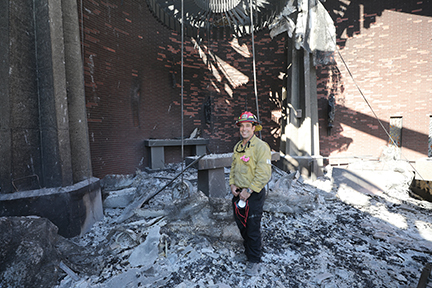
“My brother lost his home. I have close friends who lost everything but the shirts on their backs, and they belong to that church too. So, if I could save just one thing, let it be this, so they have something to believe in,” he said.
That Saturday morning Nassour, whose station in Pacific Palisades is across the street from Corpus Christi, had been up all night battling other fires. As he sipped coffee at his desk and gazed at the ruined church, he decided to check for valuables. He wanted to protect them from looters and perhaps return something meaningful to the parish.
Scorched bricks, tiles and hunks of debris filled the nave so high that he had to crawl under the top of door frames that no longer had doors. The roof had collapsed, a burned steel frame teetered above the twisted remains of a chandelier. The pews had been consumed. Only the granite altar remained, with the solid brass tabernacle atop it and a cross above. The Blessed Sacrament was intact.
Nassour was astounded to find that the tabernacle weighed more than 300 lbs. His crew helped him get it into the station house.
“It was one of the most uplifting things,” he said. “Not everyone is religious, but they saw that and they’re like, ‘This is awesome.’ We’re doing something – at least one thing – that we can salvage for the community.”
He made many calls before he was able to reach Msgr. Liam Kidney of Corpus Christi to tell him that the tabernacle was safe and undamaged.
“He was in utter disbelief,” Nassour said.
Nassour offered to search for other sacred objects and the priest told him where to find the chalices and patens. Firefighters from Station 69 helped dig for the crushed cabinet. The chalices and patens had been severely damaged. But the firefighters recovered other sacred objects, including three unbroken containers of holy oil.
Brass withstands high heat, but Nassour suspects more was involved in the tabernacle’s survival.
“Talk to any firefighter. In any religious building what usually survives is the cross and certain specific items that are highly religious, unless they’ve been specifically set on fire,” he said.
Gabe Sanchez, a retired FBI special agent who does contract investigations for the Los Angeles Archdiocese, was sent to retrieve the tabernacle. Firefighters helped him wrestle it into his car. He drove it to St. Monica Church, where Msgr. Kidney celebrated Mass for survivors the next day.
At that Mass, the tabernacle stood on a table by the altar. Msgr. Kidney recounted Nassour calling him to ask, “I have found this big gold box. What would you like me to do with it?”
The Corpus Christi parishioners burst into applause.
Nassour was unable to attend because he was fighting fires.
(Ann Rodgers writes for Angelus, the news outlet of the Archdiocese of Los Angeles.)
